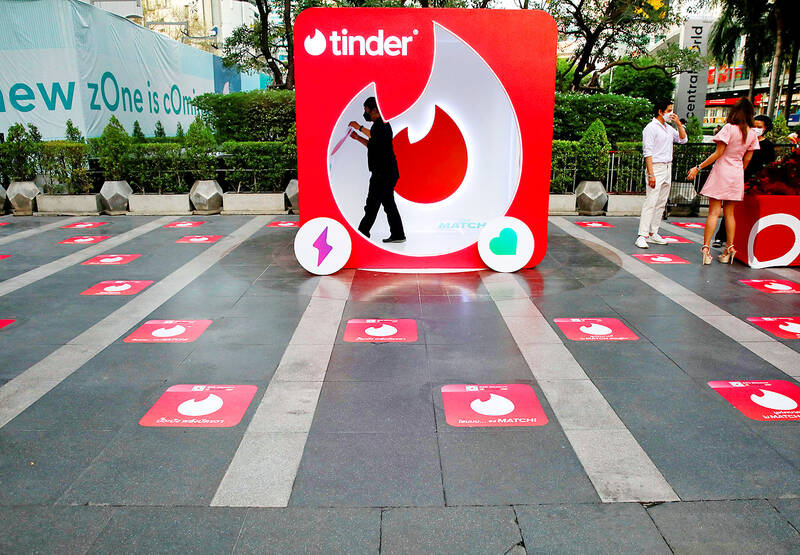Burnt-out love-seekers are shunning dating apps in their millions, but the apps are trying to woo them back with a counter offer: If you don’t want a lover, perhaps you just need a friend? The giants of the industry — Bumble and Match, which owns Tinder — have both created apps catering to friendly meetups, joining countless smaller platforms that have already entered the friend zone.
Bumble For Friends launched in July last year and by the third quarter of this year had around 730,000 monthly active users, according to figures from market intelligence firm Sensor Tower.
Bumble has also acquired the Geneva app, which caters to people wanting to form groups around particular interests.

Photo: Reuters
“It’s just the beginning of our vision to expand the company’s footprint and helping people find connections broadly,” Bumble CEO Lidiane Jones said during the Web Summit in Lisbon on Wednesday.
Match, meanwhile, launched the Yuzu app in February targeting the Asian community in the US, offering a choice between friendly or romantic encounters.
The group has also been testing a service dedicated to friendship in France on its dating app for older people, DisonsDemain.
Both firms have suffered dramatic slumps since the boom times of the pandemic, when millions turned to the apps during periods when governments restricted people’s movements.
‘APP FATIGUE
Sensor Tower said while Bumble For Friends was soaring, its dating app had shed eight percent of its monthly active users between the start of October last year and this year — the figure now standing at 21 million.
Tinder, by far the biggest dating app with around 53 million monthly active users, saw a 16 percent slump in the same period.
Seema Shah of Sensor Tower said users were feeling “app fatigue.”
“It’s affecting all apps but in particular these dating apps. People are just kind of tired of it,” she said.
Tinder was hit particularly hard as it targeted younger users between 18 and 22.
“This is the same age group that likes to do a lot of things in person,” she said.
These declines are hitting the firms where it really hurts — the wallet.
Match Group has shed more than US$40 billion from its value in three years.
Bumble achieved a valuation of more than US$20 billion when it went public in 2021, but it is now worth only about US$1.3 billion.
The firm announced the layoff of a third of its workforce in February.
And success in the friend zone is far from assured, with plenty of apps already battling to attract future BFFs.
NOVELTY FACTOR
The apps often cater to particular situations — WeRoad and TripBFF connect solo travelers, Wink and Plura help people find friends based on their interests.
French app Timeleft, launched last year, brings together six strangers every week for dinner at a restaurant.
The app has already organized dinners in 280 cities across 62 countries and is getting closer to profitability, said cofounder Maxime Barbier.
He said diners were assembled using an algorithm enriched by the results of personality tests taken by the users.
For Arthur Czubinski, a 32-year-old translator, it is a winning formula.
He said he had been to 12 dinners organized by the app in just a few months.
“Some of the tables have been incredible,” he said.
But Seema Shah suggested the first flushes of success for friendship apps were at least partly down to novelty.
She expressed doubt people would pay in the long term.
“It’s probably easier to find friends in your area if you join some activity or through your job,” she said.

The primaries for this year’s nine-in-one local elections in November began early in this election cycle, starting last autumn. The local press has been full of tales of intrigue, betrayal, infighting and drama going back to the summer of 2024. This is not widely covered in the English-language press, and the nine-in-one elections are not well understood. The nine-in-one elections refer to the nine levels of local governments that go to the ballot, from the neighborhood and village borough chief level on up to the city mayor and county commissioner level. The main focus is on the 22 special municipality

The People’s Republic of China (PRC) invaded Vietnam in 1979, following a year of increasingly tense relations between the two states. Beijing viewed Vietnam’s close relations with Soviet Russia as a threat. One of the pretexts it used was the alleged mistreatment of the ethnic Chinese in Vietnam. Tension between the ethnic Chinese and governments in Vietnam had been ongoing for decades. The French used to play off the Vietnamese against the Chinese as a divide-and-rule strategy. The Saigon government in 1956 compelled all Vietnam-born Chinese to adopt Vietnamese citizenship. It also banned them from 11 trades they had previously

Hsu Pu-liao (許不了) never lived to see the premiere of his most successful film, The Clown and the Swan (小丑與天鵝, 1985). The movie, which starred Hsu, the “Taiwanese Charlie Chaplin,” outgrossed Jackie Chan’s Heart of Dragon (龍的心), earning NT$9.2 million at the local box office. Forty years after its premiere, the film has become the Taiwan Film and Audiovisual Institute’s (TFAI) 100th restoration. “It is the only one of Hsu’s films whose original negative survived,” says director Kevin Chu (朱延平), one of Taiwan’s most commercially successful

Jan. 12 to Jan. 18 At the start of an Indigenous heritage tour of Beitou District (北投) in Taipei, I was handed a sheet of paper titled Ritual Song for the Various Peoples of Tamsui (淡水各社祭祀歌). The lyrics were in Chinese with no literal meaning, accompanied by romanized pronunciation that sounded closer to Hoklo (commonly known as Taiwanese) than any Indigenous language. The translation explained that the song offered food and drink to one’s ancestors and wished for a bountiful harvest and deer hunting season. The program moved through sites related to the Ketagalan, a collective term for the